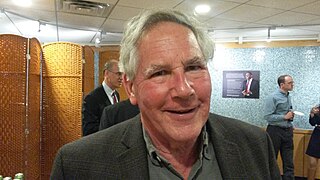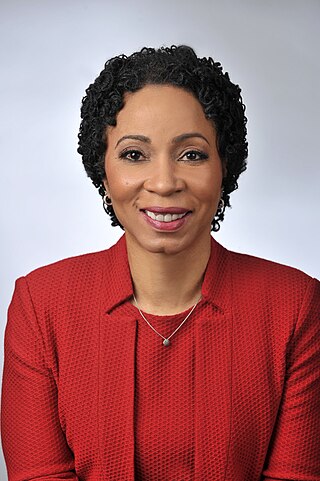Related Research Articles

Meharry Medical College is a private historically black medical school affiliated with the United Methodist Church and located in Nashville, Tennessee. Founded in 1876 as the Medical Department of Central Tennessee College, it was the first medical school for African Americans in the South. While the majority of African Americans lived in the South, they were excluded from many public and private racially segregated institutions of higher education, particularly after the end of Reconstruction.

Louis Wade Sullivan is an active health policy leader, minority health advocate, author, physician, and educator. He served as the Secretary of the United States Department of Health and Human Services during President George H. W. Bush's Administration and was Founding Dean of the Morehouse School of Medicine.

David Satcher is an American physician, and public health administrator. He was a four-star admiral in the United States Public Health Service Commissioned Corps and served as the 10th Assistant Secretary for Health, and the 16th Surgeon General of the United States.

Morehouse School of Medicine (MSM) is an independent and private historically-Black medical school in Atlanta, Georgia. Originally a part of Morehouse College, the school became independent in 1981.

The Journal of Health Care for the Poor and Underserved is an academic journal founded in 1990 by David Satcher, then President of Meharry Medical College who later became the 16th Surgeon General of the United States. JHCPU is published by the Johns Hopkins University Press for Meharry and is affiliated with the Association of Clinicians for the Underserved.

Robert Lee "Bobby" Satcher Jr. is an American orthopedic surgeon, chemical engineer, and former NASA astronaut. He participated in two spacewalks during STS-129, accumulating 12 hours and 19 minutes of extravehicular activity. Satcher holds two doctorates and has received numerous awards and honors as a surgeon and engineer.

Jonathan Evan Fielding is a board-certified physician in both Pediatrics and Preventive Medicine, and the former director and health officer of the Los Angeles County Department of Public Health. At UCLA, he is a Distinguished Professor in the Fielding School of Public Health and a Professor in the David Geffen School of Medicine. He is the founder and co-director of the UCLA Center for Health Advancement in the UCLA Fielding School of Public Health.

Victor Joseph Dzau is a Chinese-American doctor and academic. He serves as the President of the United States National Academy of Medicine of the United States National Academy of Sciences and Vice Chair of its National Research Council. He is Chancellor Emeritus and James B. Duke Professor of Medicine at Duke University and former president and chief executive officer of Duke University Medical Center.

Norman Daniels is an American political philosopher and philosopher of science, political theorist, ethicist, and bioethicist at Harvard University and the Harvard T.H. Chan School of Public Health. Before his career at Harvard, Daniels had built his career as a medical ethicist at Tufts University in Medford, Massachusetts, and at Tufts University School of Medicine, also in Boston. He also developed the concept of accountability for reasonableness with James Sabin, an ethics framework used to challenge the healthcare resource allocation in the 1990s.

Helene D. Gayle is an American physician, and academic and non-profit administrator. She has been president of Spelman College since 2023. She formerly was CEO of the Chicago Community Trust, one of the nation's leading community foundations. Earlier in her career she was the director of international humanitarian organization CARE, and spent much of her career in the field of public health research in epidemiology at the CDC.
Lisa A. Cooper is an American internal medicine and public health physician who is the Bloomberg Distinguished Professor of Equity in Health and Healthcare at Johns Hopkins University, jointly appointed in the Johns Hopkins School of Medicine, Johns Hopkins School of Nursing and in the departments of Health, Behavior and Society, Health Policy and Management; Epidemiology; and International Health in the Johns Hopkins Bloomberg School of Public Health. She is the James F. Fries Professor of Medicine in the Division of General Internal Medicine, Director of the Johns Hopkins Center for Health Equity, and Director of the Johns Hopkins Urban Health Institute. Cooper is also a Gilman Scholar and a core faculty member in the Welch Center for Prevention, Epidemiology, and Clinical Research. She is internationally recognized for her research on the impact of race, ethnicity and gender on the patient-physician relationship and subsequent health disparities. She is a member of the President’s Council of Advisors on Science and Technology (PCAST). In 2007, she received a MacArthur Fellowship.

Barbara Starfield was an American pediatrician. She was an advocate for primary health care worldwide. Her academic and professional life was almost fully dedicated to the Johns Hopkins University.

Consuelo H. Wilkins is an American physician, biomedical researcher, and health equity expert. She is Senior Vice President and Senior Associate Dean for Health Equity and Inclusive Excellence at Vanderbilt University Medical Center. She is a professor of medicine in the Department of Medicine, Division of Geriatrics at Vanderbilt University School of Medicine and has a joint appointment at Meharry Medical College. She additionally serves as one of the principal investigators of the Vanderbilt Clinical and Translational Science Award, Director of the Meharry-Vanderbilt Community Engaged Research Core (CTSA) and as vice president for Health Equity at Vanderbilt University Medical Center.
Rashi Fein was an American health economist termed "a father of Medicare" in the United States and "an architect of Medicare", was Professor of Economics of Medicine, Emeritus, in the Department of Global Health and Social Medicine at Harvard Medical School, and the author of the book Medical Care, Medical Costs: The Search for a Health Insurance Policy.
Joan Y. Reede is an American physician. She is Harvard Medical School's inaugural dean for diversity and community partnership in the Office of Diversity, Inclusion, and Community Partnership. She is also a member of the National Academy of Medicine. She is known for creating programs that mentor and support minority physicians and female physicians. Alumni of her programs have created a 501(c)(3) organization called The Reede Scholars in her honor.
The Rhoda and Bernard Sarnat International Prize in Mental Health was established in 1992 and is awarded annually by the National Academy of Medicine in the United States to recognize individuals, groups, or organizations for outstanding achievement in improving mental health. It is accompanied by a medal and $20,000.
Valerie Montgomery Rice is an American obstetrician, gynecologist, and college administrator. She is the president and dean of Morehouse School of Medicine.

Camara Phyllis Jones is an American physician, epidemiologist, and anti-racism activist who specializes in the effects of racism and social inequalities on health. She is known for her work in defining institutional racism, personally mediated racism, and internalized racism in the context of modern U.S. race relations. During the COVID-19 pandemic, Jones drew attention to why racism and not race is a risk factor and called for actions to address structural racism.
Kisha Braithwaite Holden is a scientist known for her research on mental health of African-Americans and members of other minority groups. She is professor of psychiatry and behavioral sciences and community health & preventive medicine and interim director of Satcher Health Leadership Institute (SHLI) at Morehouse School of Medicine.

James Earl King Hildreth is an American immunologist and academic administrator. Hildreth is the 12th president and chief executive officer of Meharry Medical College. He is known for his work on HIV/AIDS and was the first African American to hold a full tenured professorship in basic research at Johns Hopkins School of Medicine. Edward D. Miller calls Hildreth "one of the most influential HIV researchers in the world".
References
- ↑ "Daniel E. Dawes Named Director of Satcher Health Leadership Institute at Morehouse School of Medicine". Morehouse School of Medicine.
- ↑ Morris, Ken (20 January 2023). "Meharry to launch new global health equity institute led by health policy expert Daniel E. Dawes". Meharry Medical College.
- ↑ "Author Daniel E. Dawes comes to the defense of Obamacare". National Catholic Reporter.
- ↑ "Law grad fights for better healthcare for the economically disenfranchised". Nebraska Today.
- ↑ "National Academy of Medicine Elects 100 New Members". NAM.
- ↑ "Directory of Fellows and Members" (PDF). media.nyam.org. 2016-08-08.
- ↑ Valle, Mahia (20 October 2021). "Daniel E. Dawes Appointed by the Biden-Harris Administration to the CDC's Federal Advisory Committee". Satcher Health Leadership Institute.
- ↑ "Council Member Profiles | National Institute of Nursing Research". www.ninr.nih.gov. Retrieved 2024-11-05.
- ↑ Cerminara, Kathy L. (October 2017). "Daniel E. Dawes, 150 Years of ObamaCare (Johns Hopkins University Press 2016)". Journal of Legal Medicine. 37 (3–4): 613–619. doi:10.1080/01947648.2017.1400891. ISSN 0194-7648.
- ↑ Bell, Jonathan (1 February 2018). "Daniel E. Dawes, 150 Years of ObamaCare". Social History of Medicine. 31 (1): 200–201. doi:10.1093/shm/hkx068.
- ↑ Lin, Kenneth (2022). "The Political Determinants of Health". Family Medicine. 54 (1): 65–66. doi:10.22454/FamMed.2022.776082.